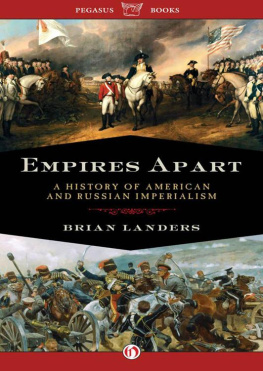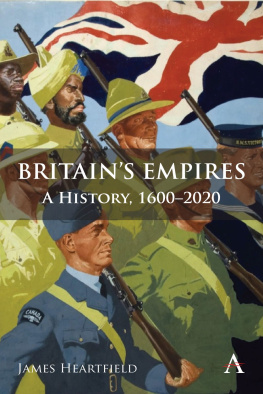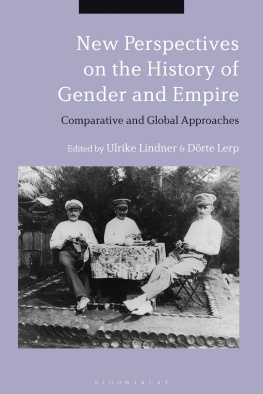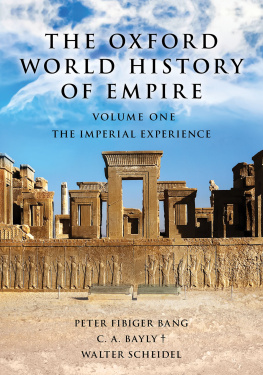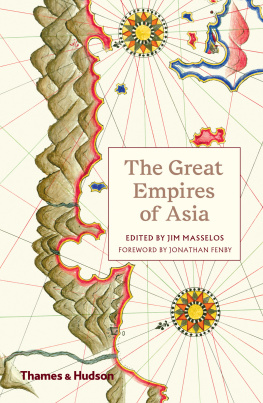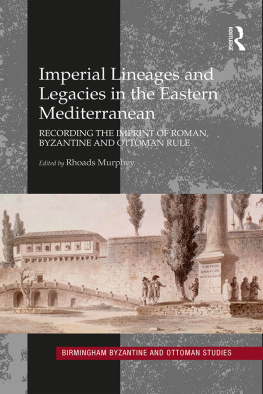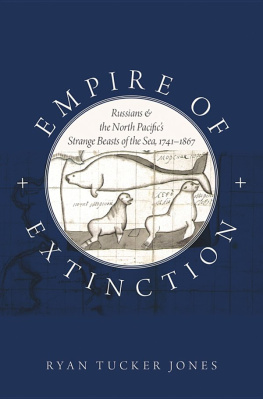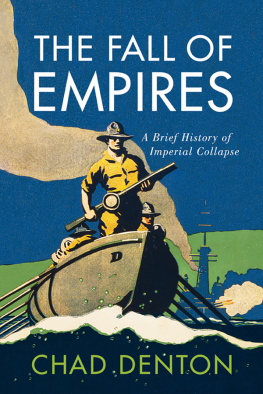
EMPIRES APART
EMPIRES APART
A HISTORY OF AMERICAN AND RUSSIAN IMPERIALISM

BRIAN LANDERS

PEGASUS BOOKS
NEW YORK
There are now two great nations in the world which, starting from different points, seem to be advancing toward the same goal: the Russians and the Americans. Both have grown in obscurity, and while the worlds attention was occupied elsewhere, they have suddenly taken their place among the leading nations, making the world take note of their birth and of their greatness almost at the same instant. All other peoples seem to have nearly reached their natural limits and to need nothing but to preserve them; but these two are growing. Their point of departure is different and their paths diverse; nevertheless, each seems called by some secret desire of Providence one day to hold in its hands the destinies of half the world.
Alexis de Tocqueville, De la Dmocratie en Amrique (183540)
The one duty we owe to history is to rewrite it.
Oscar Wilde, Intentions (1891)
CONTENTS

ACKNOWLEDGEMENTS

It may seem perverse to start by thanking a rival publisher but this book would never have seen the light of day without the support, advice and practical assistance of my colleagues at Penguin. So many of them have contributed in so many ways that I cannot begin to thank each of them by name - thank you all.
Despite the numerous introductions my colleagues provided I have no agent to thank. With the exception of the one who considered this book approaching the wild borders of Chomskystan all the agents who read my manuscript came out with the same response: love the book but as youre not a celebrity, politician or academic the big bookselling chains wont stock it. I hope they are wrong and feel incredibly lucky to have stumbled across a publisher, Corinne Souza at Picnic Publishing, who responded so eagerly to my manuscript. Corinne has patiently guided me through the intricacies of an industry I quite erroneously thought I knew. My editor Simon Fletcher was equally patient in making me completely rewrite the middle third of the book to produce a far more coherent narrative as well as stripping away the distracting footnotes and obsessive capitalisations with which I had littered my original text. John Schwartz produced a cover I love and Judith Antell and Alex Hippisley-Cox helped ensure that once produced the book hopefully will have an audience.
My greatest debt must be to all those writers whose works I have devoured and regurgitated in forms that they may or may not recognise. I have listed all the sources at the back of the book and comment on some of the most influential texts on the website www.empiresapart.com . I especially appreciate permission to quote from the following verbatim: Niall Ferguson, Empire (Penguin Books Limited, copyright Niall Ferguson, 2003); Samuel Eliot Morison, The Oxford History of the American People (Oxford University Press, 1965, by permission of Oxford University Press, Inc.); Peter Neville, Russia, the USSR, the CIS and the Independent States (published in the UK by the Windrush Press, a division of the Orion Publishing Group and in the US as A Travellers History of Russia by Interlink Books, an imprint of Interlink Publishing Group, Inc.; text copyright Peter Neville, 2001); and Richard Pipes, Russia Under the Old Regime (Weidenfeld & Nicolson, a division of The Orion Publishing Group).
Finally for far too long my wife and family have put up with me spending weekends and holidays buried in my notes. My thanks to my wife Sarah, son Joseph and daughters Catherine and especially Alex, who obliterated my own feeble attempt at a website and substituted her own creative flair.
Writing is a thoroughly selfish pursuit, I hope that some readers feel as challenged as I have been by the prospect of encountering new ways to interpret the past, understand the present and prepare for the future.
FOREWORD
BY ANDREAS WHITTAM SMITH

Brian Landers has written a piercing account of American history from its colonial beginnings to its present role as an unacknowledged empire that bestrides the world. Concerned as he is to expose the myths that nations create about themselves, he bases his analysis upon a revealing comparison of American and Russian expansion through the centuries. This technique forces the observer to recognise similarities, identify differences and question why both similarities and differences exist. In a sense, then, the reader gets two books for the price of one, Russian history as well as American.
The parallels are striking. In the very same decade, the 1860s, Russia emancipated its serfs and the US freed its slaves. The ideology of corporate capitalism emerged at the same time as Marxism. Both nations marched towards the Pacific from their ancestral lands, from the Thirteen Colonies in the one case and from Muscovy in the other. Both reached the ocean by conquest of nomadic tribes or as Americans like to say, by settlement or colonisation or, occasionally, by annexation. And finally, to take a question, was there really any difference between the Monroe Doctrine that America used to justify its interventions in Latin America and in the Caribbean and the concept of Pan-Slavism that Russia prayed in aid when exercising its designs on the Balkans?
This approach leads to a major theme of Mr Landers work, that the US is and always has been an imperialist power. Americans act like imperialists, he writes, but dont talk like imperialists. It isnt even an established fact that there is or ever has been an American Empire. What is a fact, however, is that since the US marines invaded Libya in 1805, American troops on average have intervened somewhere abroad more than once a year.
Mr Landers is not a conventional historian. His skills are derived from a business career as well as from the academy. This unusual combination produces rare insight. He also has a way with aphorisms. Russia is an inferiority complex trying to find itself. America is a superiority complex trying to sell itself. That is what Empires Apart seeks to demonstrate.
CHAPTER 1
RURIKS LAND

History is portrayed as a science. Remains are located through geophysics, their age is determined by radio carbon dating and they are analysed through DNA testing. The results are served up on TV history channels dedicated to revealing the truth about the past. And yet popular history remains as much subject to emotion as to reason. Centuries-old battles are refought in the cities of Northern Ireland or the mountains of Kosovo. Lawyers make money trying to redress the evils of slavery or the Holocaust. Russians deny the crimes of Stalin, and Americans forget that they once owned an empire stretching from the Caribbean to the Philippines.
History may be consciously rewritten; much more often it simply evolves. Each generation reworks the tales handed down to it. The experiences and values of today colour the stories of yesterday. The history of all nations is modified, but the embellishments of Russian history are in a class of their own.
Next page
